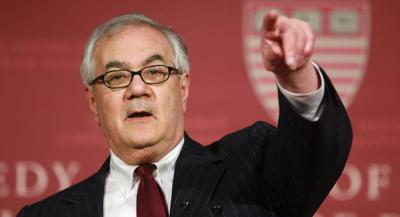March 25, 2015
 Barney Frank
Barney Frank
Political memoirs often deploy ghost writers, lawyers, and consultants to help the author homogenize the past and move mistakes to the passive voice. Barney Frank is made of sterner stuff.
In his new memoir, “Frank,” a roller coaster ride through the past half century, the author advises his readers: “Never believe anyone who says, ‘I hate saying I told you so.’ Saying ‘I told you so’ is always enjoyable and one of the few pleasures that becomes more enjoyable with age.”
The advice is superfluous. He barbecues conservatives, liberals, reporters (a “thin-skinned group”), and his own “weaknesses and failings.” It is a well-written, marvelous memoir.
His determination to advance gay rights, woven throughout the narrative, has given Frank an admiration for basic, old-fashioned politics, which leads him to criticize the passivity of liberals (the word he uses, not the timid euphemism “progressives”).
“Given the left’s vision of itself as a tribune of the people,” he writes, “it’s a bitter irony that conservatives have proved so much better at grassroots advocacy. They are likelier to forcefully inform members of Congress of their policy preferences; liberals are more inclined to hold public demonstrations, in which like-minded people gather to reassure each other of their beliefs.” The National Rifle Association, he notes, “wins at the ballot box, not in the streets. ... They do not have marches.”
Frank believes in politics because he has seen it work on behalf of gay rights. As a state legislator in 1979, he introduced gay and lesbian constituents to Tip O’Neill and found the US House speaker “wholly sympathetic.” O’Neill urged “all LBGT people to come out — although he did not use the phrase. Referring specifically to the prohibition of security clearances for LGBT people, he said, ‘If all the homosexuals identified themselves, there wouldn’t be any argument that they were subject to blackmail.’” This white-haired politician “was not only a confirmed liberal,” but “sophisticated and insightful ... a very smart man.”
Frank had been a closet gay throughout his public life. In the Massachusetts Legislature, he maintained a “firm determination to keep my secret.” His dilemma, until 1987, was that “I was prepared to be something of a coward when it came to acknowledging who I really was, but I was even more determined not to be a hypocrite.”
Frank went to Harvard College and Harvard Law School, after growing up in Bayonne, N.J., where he pumped gas at the family truck stop. In one of those places (guess which), he acquired a wit as quick as any stand-up comic’s:
“My sense of humor, which I’m glad to have, and which I cannot think of anything I did to earn, was also a great polemical weapon.”
Frank uses the phrase “in fairness to” some Republicans — Dan Lungren, Alan Simpson, even Dick Cheney — but not Newt Gingrich, elected speaker in 1994 with a nihilist doctrine still in force. Gingrich, Frank writes, “believed that Democrats should not be described as reasonable, patriotic, honest people who had incorrect policy views, but as immoral, corrupt, treasonous hacks who threatened the nation’s future.”
In Boston and Washington, few who encountered the author were in doubt where they stood with Frank. He often gave any politician, constituent, critic, supporter, or reporter his opinion of their opinion. (Trust me.)
In “Frank,” he turns his candor on himself. During one re-election campaign, “I became extremely argumentative, even by my previous standards. I was bent on winning every disputed point, even when that meant losing voter support.” Amid a concise account of the 2008 financial crisis, he describes “the single stupidest thing I have ever done in my official life.” Compared with derivatives and credit default swaps, it seems minor.
In the chapter, “Reforming Wall Street,” he recounts that he and Sen. Chris Dodd were blamed for causing, not curing, the 2008 mess, which happened during a Republican administration of “not deregulation but non-regulation.” By 2010, “the fact that we are the pro-government party merges in some voters’ minds with the notion that we are the government — all the time.”
When, retiring after 32 tumultuous years on Capitol Hill, Frank was asked “if the rancorous atmosphere in Congress had driven me out, I replied, ‘No, I’m good at rancor.’”
In a congressional debate in 2004 on gay marriage, “a former judge, Rep. John Carter, lamented that he had presided over the dissolution of 20,000 marriages, and with perfect illogic cited this as justification for not allowing us to form any,” the author recalls, probably savoring how the Texan had set himself up for a quick, intelligent, eloquent and wee bit rancorous response.
“I’m a gay man and I presided over the dissolution of none,” Barney Frank said. “I’m sorry Rush Limbaugh’s been divorced three times, but it ain’t my fault.”
Martin F. Nolan, a former reporter, columnist, editorial page editor, and Washington bureau chief for the Boston Globe, wrote this review for the San Francisco Chronicle.

